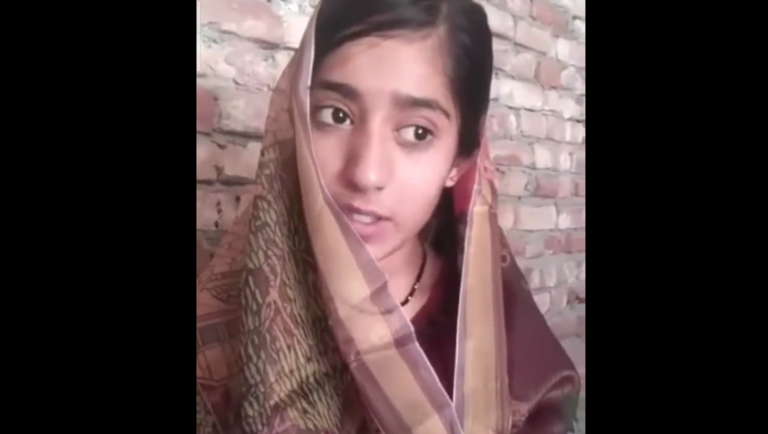
A court in Sindh has refused to allow a Hindu teenage girl, who had been abducted, forcibly converted to Islam, and married to her abductor, to go with her family despite the child saying that she wanted to return home.
According to a report, the judge rejected the statement given by 14-year-old Sohana Sharma Kumari that she wanted to return to her parents, saying the girl had given the statement under duress.
Sohana was abducted from her home in Qazi Abad in Benazirabad district on gunpoint in front of her mother on June 4. The police recovered the child after five days and presented her in court on Friday. The court has fixed June 12 for the next hearing.
According to Sohana’s mother Jamna Sharma, her daughter was abducted by her tuition teacher and his accomplices a few days after she had snubbed him for asking Sohana to give him Rs100,000.
“I scolded the teacher not to discuss such matters with my daughter, which angered him. On the day of the incident, I pleaded him not to take my daughter and offered to give him the money instead but he did not listen and took her away,” she said.
The accused later allegedly sent forged documents which stated that Sohana had converted to Islam and married him of her free will.
Sohana’s father Dilip Kumar said the information stated in the documents was incorrect.
“How can the local administration attest fake documents?” he asked.
The incident drew widespread condemnation from the Hindu community after Sohana’s video went viral on social media in which she can be heard saying that she had converted and married on her own accord.
HINDU LAWMAKERS PROTEST FORCED CONVERSION
The issue of Sohana’s abduction and forced conversion echoed in the Sindh Assembly on Thursday as Hindu lawmakers protested against the incident and demanded exemplary punishment for the abductors.
Speaking on the floor of the House, Pakistan People’s Party’s Lal Chand Ukrani expressed his anger and grief over Sohana’s abduction and conversion.
“The entire community is in a state of shock and distress over the kidnapping of the teenage girl,” an emotional Ukrani said.
Speaker Durrani intercepted him, reminding that he could speak on the issue on a point of order and asked him to sit on his seat.
Later, speaking on the point of order, Ukrani termed the incident “a cruelty” and said no religion permitted forced marriages and conversions.
“We respect every religion, but it is not appropriate to change someone’s religion by force,” he said.
Provincial Minister Giyan Chand Essrani said that it was a sad incident.
“There is a law that a girl below 18 years of age cannot change her religion and that an underage girl cannot get married,” he said adding that he was in constant touch with the provincial police chief in this regard.
MQM-P lawmaker Mangla Sharma said the victim girl was a student of class eight and she was forced to convert religion and marry.
“She is my relative, please have mercy on her,” the teary-eyed lawmaker said.
PTI dissident MPA Karim Bakhsh Gabol demanded the registration of a case against the abductors.
Parliamentary Affairs Minister Mukesh Kumar Chawla assured the House that the law of the land would be implemented in the letter and spirit.
He stressed on the fundamental right of individuals to choose their religion without any coercion, while firmly stating that no one should be compelled to convert under duress.
FORCED FAITH CONVERSIONS
Leaders and activists from Pakistan’s Hindu and Christian communities continue to report abductions and forced conversions of young women in the Muslim-majority nation.
Every year, dozens of girls – mostly teenagers – from the Hindu community mainly in the southern province of Sindh, and minority Christians in Punjab fall victim to this practice, facilitated by religious leaders and groups, according to activists.
A recent report by a Lahore-based advocacy group, Center for Social Justice, stated that at least 124 incidents of forced faith conversions were reported in 2022.
The victims of these conversions comprised 81 Hindus, 42 Christians, and one Sikh. Shockingly, 23 percent of girls were below 14 years of age, and 36 percent of them were between the age of 14 and 18 years. Only 12 percent of the victims were adults, while the age of 28 percent of the victims was not reported.
Sixty-five percent of these cases were reported in Sindh in 2022, followed by 33 percent in Punjab, and 0.8 percent each in Khyber Pakhtunkhwa and Balochistan.
Rights experts say Pakistan’s court system enables offences against religious minority girls and young women “by accepting, without critical examination, fraudulent evidence”.
“Family members say that victims’ complaints are rarely taken seriously by the police, either refusing to register these reports or arguing that no crime has been committed by labelling such abductions as ‘love marriages’,” they said.
In 2019, Imran Khan’s government ordered an investigation into forced conversions after two Hindu sisters were allegedly kidnapped and forced to convert to Islam – a case that triggered a controversy with India.
A Pakistani court later ruled that the two sisters had converted voluntarily.
Activists say a lack of legislation aimed at safeguarding minority rights has made the situation difficult for Hindu and Christian girls.
In October 2021, a parliamentary committee rejected an anti-forced conversion bill after the Ministry of Religious Affairs opposed the proposed law despite protests by legislators belonging to minority communities.
In 2016, Sindh province passed a law declaring forced conversion a punishable offence carrying a life sentence, but the region’s governor refused to ratify the legislation.
Last year, the United States placed Pakistan on a list of “countries of particular concern” for religious freedom violations.